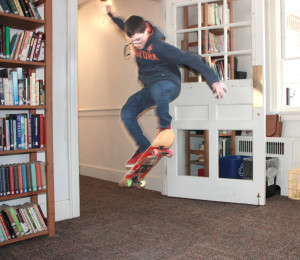
Tornado in Kansas: Zach enters the library.
Five minutes before the Hour Of No Rules, I saw Cord and Zach sneaking out of the conference room lavatory. It was Zach who had proposed to suspend the rules for an hour, and brought it to a vote with mischief behind his charming grin. And Cord—well, Cord is our homegrown chest-thumping cussing outlaw wild man, with epic experience as a defendant in the school’s judicial system. So I knew something was up and I should pay attention.
They tried to block my way as I approached the lavatory to see what they were doing. I was surprised to find everything looking normal. I opened the closet and still nothing looked ransacked or primed for trouble, so I had to ask: What Are You Up To?
They shushed me and motioned for me to follow them away, not wanting to draw attention to the lavatory. Then they quietly explained. They were acting as officials of the Games Corporation, the agency of school government responsible for the board games and the system for signing them in and out. They were moving the games from their usual place and hiding them in the lavatory closet to protect them from Disorder during the Hour Of No Rules.
Got that? This was Anarchists protecting the Establishment, and Establishmentarians celebrating Anarchy. You might think it was foxes guarding the hen house, but these were sincere foxes, acting lawfully in accord with an action duly adopted, in secret, by the Games Corporation. Their written Minutes are specific that this would be a “secret operation.” I felt the exhilaration of their adventure, and their pride in duty served.
Our lawbook has about 200 laws, all adopted by majority vote of students and staff, following public notice and parliamentary debate. That doesn’t count hundreds more provisions relating to committees, corporations, job descriptions, and so on, also adopted in democratic process. Altogether the book runs to 224 pages. Some laws go back 20 years or more, but every week School Meeting debates legislative proposals to adopt, amend, or repeal rules.
The Hour Of No Rules wasn’t anarchy (as explained in an earlier post, here). Mostly we just suspended enforcement of laws about “victimless crimes.” Rules about property damage and boundaries remained in force. We also designated one room as a “safe zone” in which all rules still applied as usual. The safe zone was barely used, and entirely empty about halfway through the hour. School Meeting’s vote to conduct the Hour Of No Rules followed four weeks of lively discussion, including hours of formal debate on the floor of School Meeting. We also spun off a large committee to comb the lawbook for rules that can be thrown out permanently.
Parents and colleagues are asking how did the Hour Of No Rules come about, and why? Was there a particular objectionable rule or perceived injustice? Was the mood more rebellious than usual? My take is no, this arose from playfulness in a place of calm security. Sometimes there are waves of dissatisfaction with a rule or situation, but not just now. The school culture is humming along with people generally living their lives busily engaged socially and in personally fulfilling pursuits. The judicial system is functioning well. The busy buzz of life in dependable community makes a sturdy foundation for bold adventure.
“Throw out the rules” is always in the air—a healthy thing, I think—a naturally recurring idea wafting through the culture from time to time. This time the air was still and thus more sensitive to such breezes. I think it was like the butterfly’s wings in Asia stirring the air to a tornado in Kansas. Playful musing in a secure culture empowered imaginations to launch bigger thoughts and chains of action.
Throwing out the rules is such a sensational idea on the surface that we may not notice deeper meaning. Adults, teens, and children of all ages engaged together for weeks in analytical examination of the proposal. What will happen? How will people behave? What cool things can I do? What should I be afraid of? Why do we have that rule? Which rules are really important? Do we need any rules at all? Why?
Although we discussed many hypotheticals, the talk was riveting, precisely because it wasn’t hypothetical. We all knew we were a simple vote away from making it happen. The meeting room was packed. The talk was starkly real and earnest. This was life, not lesson.
Deeper still was the Hour itself. Analysis and discussion are one way to critically examine our beliefs and values. Acting them out is quite another. I think children, more than teens and adults, engage in self-examination and self-authorship through action. Especially through deep play, children explore, adopt, and revise their values, beliefs, and ways of making meaning from the world. For many children, I expect the Hour will last a lifetime.
By the way, Cord is 12 years old and Zach is 13. Proudly they said I could use their real names, and maybe I did. They take their official duties seriously. They love freedom and they love responsibility, sometimes both at the same time and hard to tell apart. They know community, and skateboarding in the library, and they walked like a tightrope the sublime connecting thread.
-Jim Rietmulder
